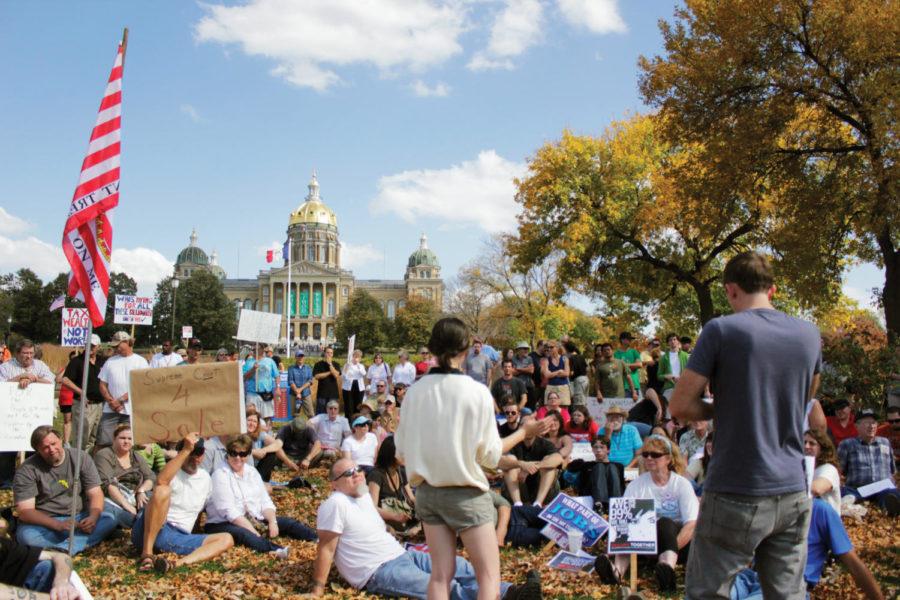‘Occupy’ protesters gather in Des Moines
Photo: Nicole Wiegand/Iowa State Daily
Protestors gather for the Occupy Iowa rally on the lawn of the Iowa State Capitol to discuss their agenda during what will become a daily meeting on Sunday, Oct. 9. While the forum was moderated, anyone wishing to present an opinion, rebuttal or proposal was allowed time to speak.
October 9, 2011
On Sunday afternoon, several hundred protesters gathered in People’s Park, west of the Iowa State Capitol Building in Des Moines, to establish a “people’s general assembly” in an effort to show solidarity with the growing “Occupy Wall Street” protests that have picked up steam the last week across the country.
The event began at noon when a conglomerate of working and middle-class workers, college students, union members and other frustrated citizens fed up with the amount of money controlling the political process in the United States hesitantly assembled in the park. Soon after, an organizer brought everyone together to establish a general assembly in which they would vote on how the occupation protests would function.
Many in the crowd appeared to be increasingly frustrated about being left out of the politics while corporations and other financial institutions dominated the political conversation. A good amount of the attendees held up signs that read “We are the 99%” and “Amend Citizens United” which were referring to a very controversial Supreme Court case that ruled in favor of corporations.
In 2010, the Supreme Court made a landmark decision in the case Citizens United v. The Federal Election Commission in which it held that the First Amendment protects corporate funding of independent political broadcasts during election season. In other words, corporations and other groups are free to give unlimited amounts of money to advertising a political agenda, usually in attack ads against a certain candidate. This domination of campaigns by corporations, among other things, was one of the main talking points for the protesters gathered in Des Moines on Sunday.
“I am here because I have something say and I want to stand with other people when I say it,” said attendee Freda Riley, who was holding up a sign that read “Hands off my Social Security. I paid for it, not you!”
Riley, who said she had heard about the event via Facebook, was insistent on the fact that taking the protest, or “occupation,” downtown to the financial center and the state Capitol was very important because it would be able to draw a lot of attention from the media and people who live and work in Des Moines.
When asked if she thought the movement could turn into a progressive counterweight to the conservative tea party movement, Riley said, “Yes, definitely. The tea party doesn’t have anything intelligent to say. That needs to be heard by Americans. And if you want to be heard, get out and say it.”
After some quick organizational procedures, the group of protesters began to discuss the specifics of how they wished to carry out their occupation protests. Some of the attendees voiced their support for Saturday, which would have coincided with MoveOn.org’s planned solidarity march with the Occupy Wall Street protesters across the nations. However, many others in attendance shot down the idea as they reiterated that they did not wish to be co-opted or hijacked by any other political or social organization.
This sentiment seemed to resonate with the majority of people who showed up, and many wished to begin the occupation protest immediately after the general assembly meeting had adjourned. The decision was finally reached to begin the occupation later that night, while committees were to be set up to address the food, sanitation, legal and communication parts of the protest.
“I just found out about this recently,” said attendee Alex Jones, a student at Mercy College of Health Sciences. “I don’t do this stuff very often, but I am inspired by the Occupy Wall Street protests in New York.”
Jones, like Riley, also seemed very optimistic about the movement’s potential, despite growing frustration with the political climate in the United States.
“I’m still going to school, and it seems that we are just being told to go along with the rising costs of education without question,” Jones said. “It’s time for something to change.”
After an extensive general assembly meeting that addressed many of the core issues related to the occupy protests, the protesters grabbed their tents and other supplies and began to dig in their heels for the coming protests at the Capitol. Since last Wednesday when the Occupy Wall Street in New York protests began to pick up steam with growing media coverage and union support, many protests have sprung up across the country and have already made an impact in Iowa, where the first protest in the state was held last Friday in Iowa City.
Additional protests are expected to be held across the state later this week, including a campus walkout and protest at Iowa State on Thursday from noon to 3 p.m. at Central Campus.

















